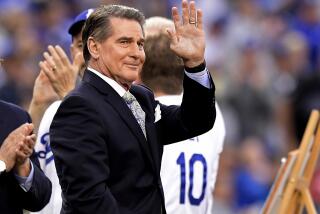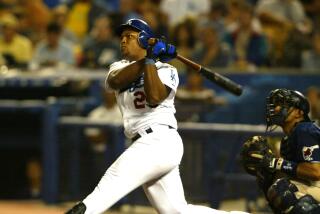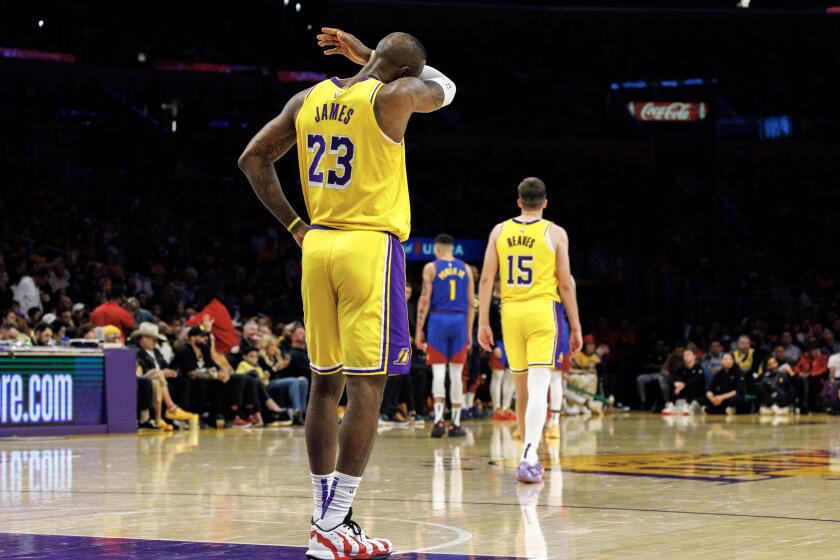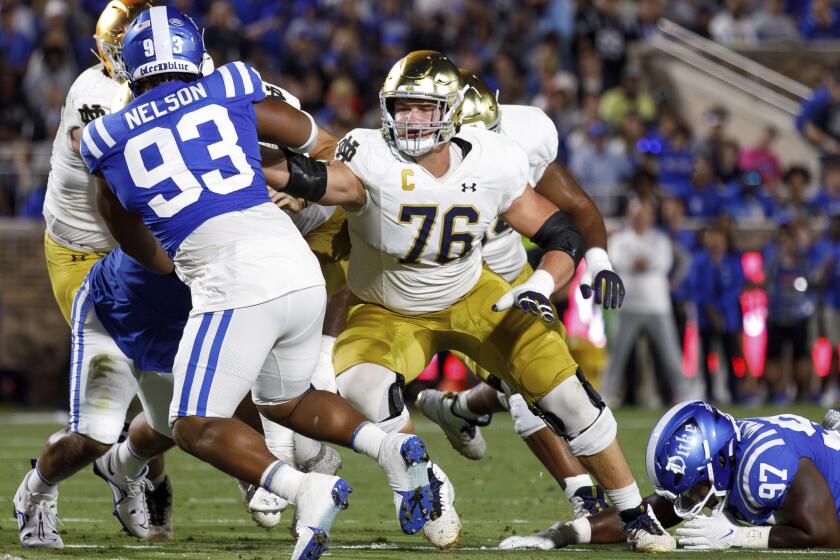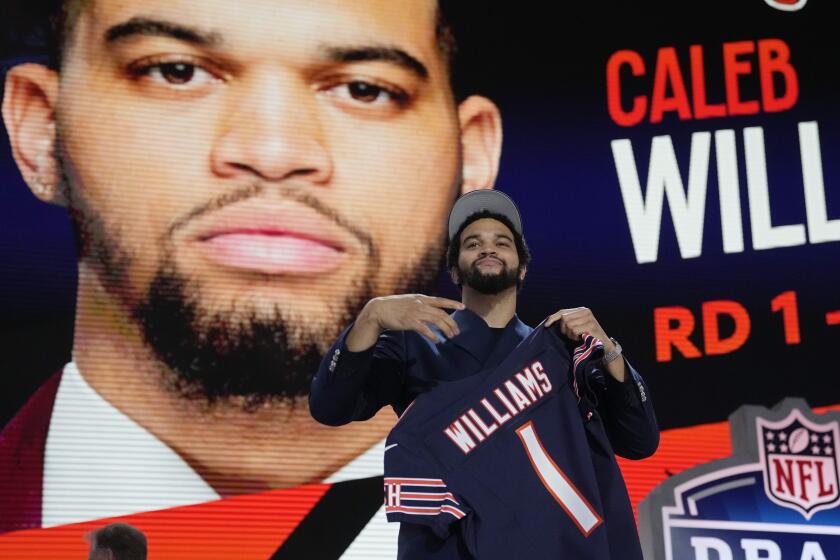Ryno-mite!
In an era when superstars preferred to speak loudly while carrying a big stick, Ryne Sandberg was a notable exception.
Sandberg’s refusal to call attention to himself may have hurt his chances of becoming a first-ballot Hall of Famer, despite nine straight Gold Gloves, 10 consecutive All-Star appearances and a flair for the dramatic in the national spotlight.
But Sandberg’s wait ended Tuesday when the soft-spoken Cubs star was elected to the Baseball Hall of Fame in his third year on the ballot.
Sandberg and five-time American League batting champion Wade Boggs were the only two players voted in as the Class of 2005 and will be inducted in ceremonies July 31 at Cooperstown, N.Y.
For Sandberg, election to the Hall helped ease the disappointment of never reaching the World Series during his standout 16-year career.
“One of my goals 20 years ago was playing in a World Series or winning a World Series, but unfortunately that was not to happen for me in Chicago,” Sandberg said. “Today, this puts an exclamation point on [my career] and diminishes the frustration I had for so many years. I’d call it some type of closure and tremendous satisfaction.”
Sandberg received 393 votes, or 76.2 percent of the record 516 ballots cast by members of the Baseball Writers Association of America. A player must receive 75 percent to gain inclusion, meaning Sandberg made it by a mere six votes, tied for the 12th-slimmest margin in history.
Boggs received the third-most votes in history (474), and was named on 91.86 percent of the ballots. Only Nolan Ryan (491) and George Brett (488) received more total votes than Boggs, who became the 41st player elected in his first year of eligibility.
Sandberg was considered a shoo-in for the Hall when he retired for good after the 1997 season. He hit 277 of his lifetime 282 home runs as a second baseman, making him the career leader at his position. He since has been surpassed by Jeff Kent.
But Sandberg’s calling card was his sterling defense, which helped make him a perennial All-Star and Gold Glove winner.
His .989 fielding percentage is the highest of any second baseman. He also holds major-league records for consecutive error-free games in a season (90 straight in 1989) and over two seasons (123 games in 1989-90).
“Defense had everything to do with me getting into the Hall of Fame,” Sandberg said. “My defense was what helped me break into the major leagues when I did. I earned an everyday job at age 22 as the starting third baseman. I started out 0-for-30 or 1-for-31, but my defense was solid and they kept me in the lineup.
“I always took a lot pride in defense. Winning that first Gold Glove in 1983 set the tone. That was the level I wanted to maintain.”
Sandberg was sometimes criticized for not getting his uniform dirty by diving for balls. But it was his peers who voted for the Gold Glove awards, who realized his range was so good he didn’t have to dive.
“I had tremendous range when I played,” Sandberg said. “I was very quick, I got to balls behind second base, got to balls behind the first baseman. I used my range to make plays on balls I didn’t have to dive for. To dive for no reason when you can’t get an out or you’re not going to prevent a run, to me, is not worth anything.”
Though Sandberg was known as a quiet, humble player, his teammates knew he also had a mischievous side.
“Most people didn’t realize he liked to light peoples’ shoes on fire,” recalled former Cubs teammate Shawon Dunston. “He’d light a match, and all of a sudden everyone was screaming. Everyone thought it was me, but we caught him doing it.”
Sandberg was an established star by the time Dunston reached the Cubs for good and he became the young shortstop’s role model.
“What I really liked about Ryno was how he approached the game as a professional,” Dunston said. “I watched everything he did.
“I’m smiling and very happy inside,” Dunston added. “After the first time on the ballot, it wasn’t looking too good. But like they say, the third time’s a charm. Now we’re waiting on Andre [Dawson].”
Dawson remains a long-shot Hall candidate in spite of his 438 career home runs and eight Gold Gloves. The former Cubs right fielder finished sixth in this year’s balloting with 270 votes, or 52.3 percent, a slight increase over his 2004 totals of 253 votes (50 percent).
“When he retired, I was under the impression he was a Hall of Fame-caliber player,” Sandberg said of Dawson. “He was in the 400-400 club, home runs and stolen bases, and that’s a very limited crowd. In his MVP season of ’87 he hit 49 home runs, and it seemed like he was hitting a home run every other day. A couple of years ago, that would be about 75 home runs. In my book he’s a Hall of Famer.”
Sandberg grew up in Spokane, Wash., and was drafted by the Phillies, who included him in the deal that sent shortstop Larry Bowa to the Cubs before the 1982 season. He became a Cubs legend with one memorable, nationally televised game on June 23, 1984, his MVP season, hitting two game-tying home runs off All-Star closer Bruce Sutter in the Cubs’ extra-inning victory over St. Louis at Wrigley Field.
After the game, Cardinals manager Whitey Herzog referred to Sandberg as “Baby Ruth” and called it one of the greatest performances he had seen.
“That was a game everybody brings to my attention,” Sandberg said. “They always ask about the game against Bruce Sutter. If Bruce Sutter was not a top-line, Hall of Fame pitcher, I don’t think that game would have meant anything. That game speaks to the type of pitcher he was, and to me, he should be in the Hall of Fame.”
Sutter, another former Cubs star, finished third in this year’s balloting with 344 votes, or 66.7 percent. He is gaining ground in his 12th year on the ballot and could jump in next year with a less than stellar list of newly eligible players.
Sandberg, bogged down by personal problems stemming from a messy divorce, abruptly retired early in the 1994 season, only to re-marry and return to the Cubs in ’96. He played two more seasons before calling it quits again.
“The Hall of Fame was never really a goal of mine,” Sandberg said. “My goal as I was playing was to try and win a championship with the Chicago Cubs and be the best player I could be. At the time of the first retirement, I had personal issues. I felt I couldn’t play up to the level of play I expected of myself and everyone expected of me.
“I retired, and a short time after that I decided I had some baseball left in me. At the age of 37, 38, I gave it another shot. All for the love of baseball and leaving on my own terms.”
Amid Tuesday’s commotion, Sandberg admitted he hadn’t given much thought to who would introduce him at the Cooperstown induction ceremony, though he later said the manager who urged him to hit for power, Jim Frey, would be the one.
“I’m just trying to pick a sport coat and finish this tornado ride,” he said. “This is the most I’ve ever talked on the telephone. I’ve had calls from Don Zimmer, Larry Bowa, Jim Hendry. It has been incredible. I’m enjoying this and getting hoarse in my voice.”
More to Read
Get our high school sports newsletter
Prep Rally is devoted to the SoCal high school sports experience, bringing you scores, stories and a behind-the-scenes look at what makes prep sports so popular.
You may occasionally receive promotional content from the Los Angeles Times.
